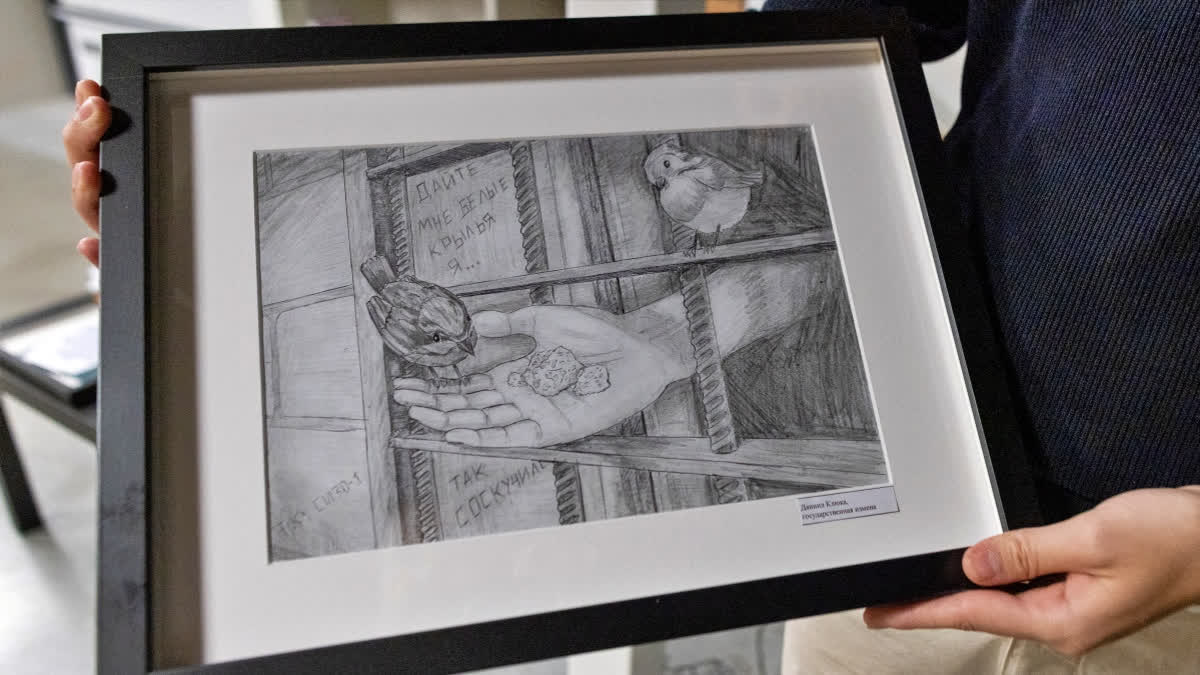Warsaw: Art teacher Daniil Klyuka believes the headmistress of the provincial Russian school where he worked reported him for doodling horns on pictures of officials in a newspaper.
The 28-year-old was later sentenced to 20 years in jail. His case illustrates the severity of the crackdown on dissent -- both real and imagined -- in Russia since the invasion of Ukraine. And how ordinary Russians are again living under the shadow of denunciation, the old Soviet practice of informing on colleagues, neighbours, friends and even family.
Until last winter, Klyuka lived a quiet life in Dankov, a town 300 kilometres (190 miles) south of Moscow, whose chief claim to fame is that the renowned novelist Leo Tolstoy died at a railway station nearby.
On the website of the state school where he worked, there are still photos of the classroom where he taught, decorated with posters of famous paintings, including a self-portrait by Van Gogh. But Klyuka's life took a nightmarish turn one day in February 2023 when he was arrested by masked members of Russia's feared FSB security service.
He was accused of sending 135,000 rubles (around $1,380) in cryptocurrency to Ukraine's ultranationalist Azov brigade, classified as "terrorist" in Russia -- a charge he denies. Klyuka believes all this happened because he idly scribbled moustaches, horns and beards onto photos of officials in a pro-Kremlin newspaper that staff at his school were expected to read.
AFP has been able to piece together his descent into the depths of the Russian penal system, where prisoners can sometimes disappear without a trace, through letters he has exchanged with a Russian anti-war activist exiled in Italy.
Hunt for 'traitors'
Antonina Polishchuk, 43, gradually learned what had happened to him after responding last year to an appeal to write to Russian political prisoners, some of whom have the right to receive letters. She decided to write to Klyuka because of a shared love of architecture and anime.
"I'm interested in architecture and my daughter is interested in anime, so I thought we could write to him together," she told AFP. Through the letters they exchanged on an official government platform, she found out Klyuka was being prosecuted for "treason" and "financing a terrorist organisation" -- charges often used by Russia to crush opposition to the war in Ukraine.
Klyuka believes his headteacher secretly informed on him. Contacted on social media, Irina Kuzicheva did not reply to AFP's requests for comment. A wave of denunciations has swept the country since March 2022 when President Vladimir Putin called for "traitors" to be hunted and for "society to purge itself", after the invasion of Ukraine. Groups such as "Veterans of Russia", led by Ildar Rezyapov, have denounced hundreds of people to prosecutors, including actors and artists.
Civil servants as well as ordinary Russians have also taken it upon themselves to report neighbours and colleagues -- some driven by greed, ambition or envy, others by the desire to remove an adversary.
'Tortured by FSB'
Klyuka's mistake was to leave the newspaper he had doodled on behind at work. "I would sometimes write 'demon' on the foreheads of some of the government representatives" in the photos, he wrote in one letter.
Klyuka said FSB agents searched his home, confiscated his phone and then tortured him "in a cellar". The agents said they found suspicious money transfers on the phone. The teacher said he was tortured into confessing that he had donated to the Ukrainian military, before insisting he had sent money to a Ukrainian cousin whose family had fled the invasion.
The cousin, Mykyta Laptiev, confirmed to AFP that he received the money and had used it to take care of his sick father, Klyuka's uncle. It was impossible to verify the prisoner's other claims since the case was classified as secret by the FSB and lawyers can be jailed for discussing it.
Secret trial
After corresponding for six months, Polishchuk realised that Klyuka had no real legal representative -- only a state-appointed lawyer who "de facto worked for the government". His family could have hired a lawyer themselves, she said, but "they were really intimidated. The FSB scares everybody."
